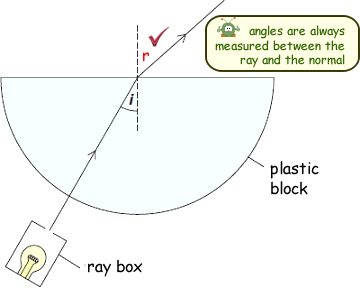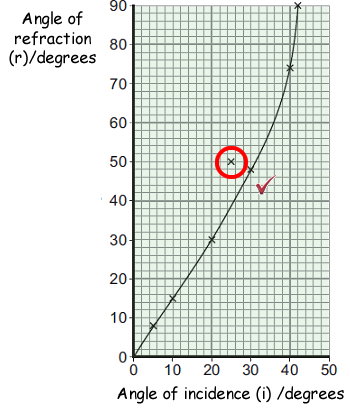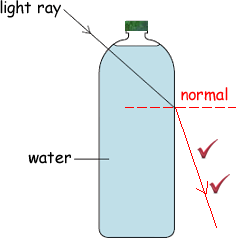GCSE questions on refraction
Q2. A student investigated the refraction of light as it passed out of a clear plastic block into the air. The diagram shows the apparatus the student used.

(a) The angle 'i' is the angle of incidence.
Use the letter 'r' to mark the angle of refraction on the diagram above.
(1 mark)
(b) The student measured the angle of refraction for different angles of incidence. The results are shown in the graph below.

(i) One of the results seems to be anomalous.
Draw a ring around the anomalous data point on the graph
(1 mark)
(ii) The student did measure the angles of incidence accurately.
What is likely to have caused the anomalous result?

Any practical suggestion that would lead to the angle r being incorrect was given a mark. eg
 placing the protractor in the wrong place
placing the protractor in the wrong place 
 not marking the refracted ray correctly / accurately
not marking the refracted ray correctly / accurately 
 ray box has been moved
ray box has been moved 
(1 mark only)
(iii) Choose from the table below the conclusion that the student can make from the results shown in the graph.
Put a tick next to your choice.
| The angle of refraction is |
less than |
the angle of incidence. |
|
| eaual to |
|
| greater than |
 |
(1 mark)
(c) Light travelling from water into air is refracted in the same way as when light travels from plastic into air. The diagram below shows a large bottle, filled with water. The bottle is made from clear plastic.

Draw onto the diagram the path of the light ray as it passes out of the bottle into the air.
(2 marks)
(d) In some countries, people are too poor to pay for electricity. Some people living in small houses with no natural light use bottles filled with water as a sort of light bulb. The bottles are fitted into small holes in the roof of the house. Sunlight goes into the bottle of water. When the light leaves the bottle, the light is refracted, causing sunlight to spread into the room.

(i) What is likely to be the most important outcome of using this simple device to provide light?
Tick one box in the table below.
People will have enough light to work inside their homes. |
 |
Fewer plastic bottles will be thrown into rubbish tips |
|
Plastic bottles will increase in value |
|
(1 mark)
(ii) Suggest one disadvantage of using this device compared with using a light bulb.
Any sensible suggestion was awarded a mark, for example:
 does not work at night
does not work at night 
 no control over light
no control over light 
 cannot switch the light on and off
cannot switch the light on and off 
 cannot control brightness
cannot control brightness 
(Maximum 1 mark)
(Total 8 marks)










